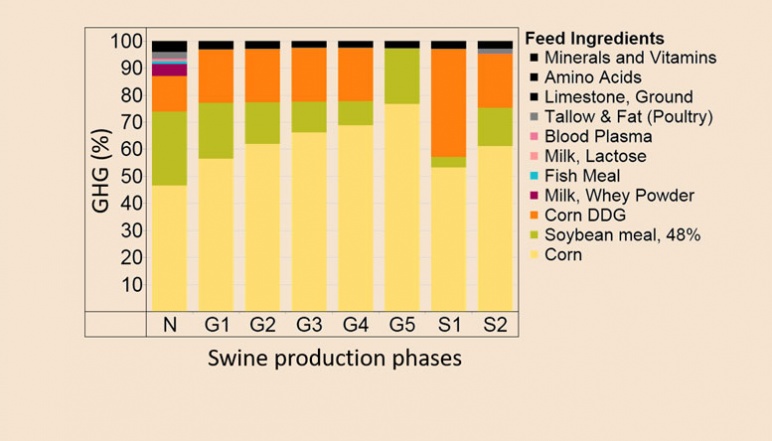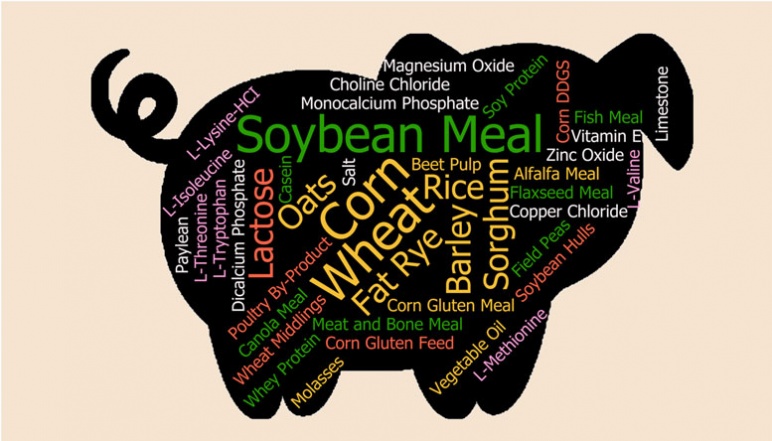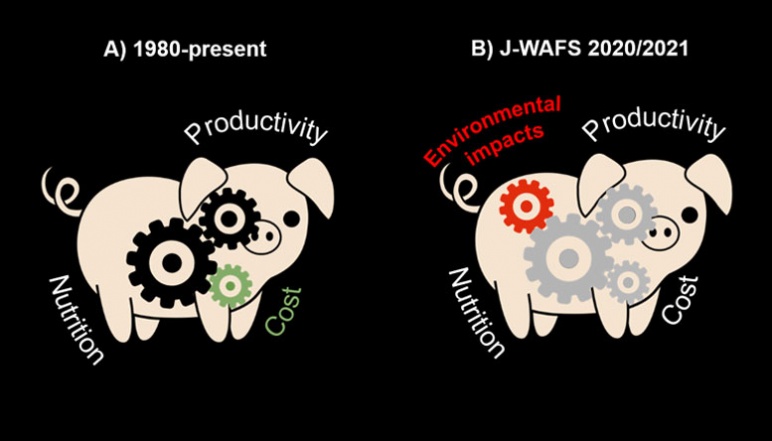Our Research Multi-criteria diet formulation for sustainable swine production

Half of greenhouse gas emissions (GHG) originate from feed ingredients used in swine production. Corn and soybean meal are major sources of energy and protein in swine diets. Swine production phases include nursery (N), growth (G1-G5), sow gestation (S1), and sow lactation (S2). Credit: Burek et al. 2015. Feeding Strategies to Mitigate Cost and Environmental Footprint of Pig Production in the US, in: Waste To Worth 2015 Seattle WA

There are more than 180 feeds that could be fed to swine (NRC 2012). The top 100 US animal feeds database includes nutrient characteristics, cost, carbon footprint, water footprint, and land use (Burek 2012). Credit: NRC, 2012. Nutrient Requirements of Swine: Eleventh Revised Edition. The National Academies Press, Washington, DC. Burek et al. 2014. Developing Environmental Footprint, Cost, and Nutrient Database of the US Animal Feed Ingredients.

A) With development of large-scale production systems, advances in animal nutrition, and linear optimization, swine industry focused on reducing the cost, while maintaining productivity. B) This grant will support the development of a new tool for swine industry to optimize existing diets with feed ingredients that have lower carbon footprint, water footprint, and land use.
Principal Investigator
Jasmina Burek
- Former Postdoctoral Associate
- MIT Materials Systems Laboratory
Jasmina Burek holds a Ph.D. in Mechanical Engineering from the University of Arkansas and is currently a Postdoctoral Associate at the MIT Materials Systems Laboratory. She has over 15 years of research experience in environmental modeling of complex systems including agriculture, renewable energy, and buildings.
Challenge:
Feed ingredients contribute to 50% of total greenhouse gas emissions in swine production systems. How can we create a tool that will help the swine industry reduce environmental impacts while maintaining cost-effectiveness and productivity?
Research Strategy
- Develop an algorithm for the swine industry to formulate nutritionally balanced, cost-effective, and environmentally friendly swine rations without a loss of productivity
- Integrate a multi-criteria optimization of rations with the Pig Production Environmental Calculator, which includes a swine growth model, infrastructure, manure management, dead animal disposal, and farm operation costs
- Evaluate the sustainability of the alternative swine diet formulations applied to the top swine production states
Project description
Worldwide concern about the environmental impacts of livestock production has been increasing. Pork is the No. 1 source of animal protein worldwide, thus reducing environmental impacts is a high priority for the swine industry. Swine producers have been focusing on optimizing feed costs while maximizing profitability. Feed ingredients contribute to 50% of total greenhouse gas (GHG) emissions of swine production systems, yet environmental impacts have not been included in formulating diets.
After constructing a comprehensive database that links swine feed ingredients’ nutrient characteristics to costs and environmental impacts, we will develop a new tool to optimize existing diets with feed ingredients that have a lower carbon footprint, water footprint, and land use. The tool will be available to swine industry, feed producers, nutritionists, and farmers through a stand-alone application.
Alternative diets may help diversify current swine rations, reduce environmental impacts, and preserve land and water. Many developing countries also have large scale swine production systems, thus this research will also provide recommendations on how to adapt the diet formulation model for other markets including developing countries. Finally, the tool could be adapted to other animals.
Outcomes
- Developed regionally specific (Brazil, Nigeria, and Kenya) multi-objective optimization models, which can formulate nutritionally sound swine diets based on minimum nutritional requirements and feed ingredient availability
- Built regionalized, comprehensive databases of swine feed ingredients’ nutrient characteristics and cost and availability, and nutritional requirements for swine production in Brazil, Nigeria, and Kenya
- Linked swine feed ingredients to the Global Feed LCA Institute (GFLI) database and other publicly available databases and literature with their approximate environmental impacts
- Trained partners from Nigeria and Kenya to use Pig Production Environmental Footprint Calculator, and about life cycle assessment (LCA) method, and using OpenLCA software and different databases
Additional Details
Impact Areas
- Food
- Climate & Sustainability
Research Themes
- Sustainability & Adaptation
- Transforming Food Systems
Year Funded
- 2020
Grant Type
- Other
Status
- Completed
